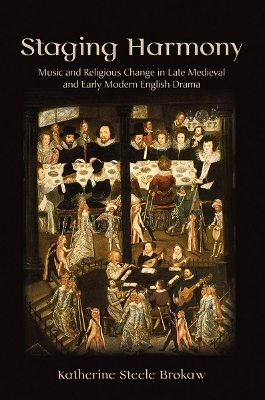
Staging Harmony
Music and Religious Change in Late Medieval and Early Modern English Drama
Seiten
2016
Cornell University Press (Verlag)
978-1-5017-0314-0 (ISBN)
Cornell University Press (Verlag)
978-1-5017-0314-0 (ISBN)
In Staging Harmony, Katherine Steele Brokaw reveals how the relationship between drama, music, and religious change across England's long sixteenth century moved religious discourse to more moderate positions.
In Staging Harmony, Katherine Steele Brokaw reveals how the relationship between drama, music, and religious change across England’s long sixteenth century moved religious discourse to more moderate positions. It did so by reproducing the complex personal attachments, nostalgic overtones, and bodily effects that allow performed music to evoke the feeling, if not always the reality, of social harmony. Brokaw demonstrates how theatrical music from the late fifteenth to the early seventeenth centuries contributed to contemporary discourses on the power and morality of music and its proper role in religious life, shaping the changes made to church music as well as people’s reception of those changes. In representing social, affective, and religious life in all its intricacy, and in unifying auditors in shared acoustic experiences, staged musical moments suggested the value of complexity, resolution, and compromise rather than oversimplified, absolutist binaries worth killing or dying for.
The theater represented the music of the church’s present and past. By bringing medieval and early Tudor drama into conversation with Elizabethan and Jacobean drama, Brokaw uncovers connections and continuities across diverse dramatic forms and demonstrates the staying power of musical performance traditions. In analyzing musical practices and discourses, theological debates, devotional practices, and early staging conditions, Brokaw offers new readings of well-known plays (Marlowe’s Doctor Faustus, Shakespeare’s The Tempest and The Winter’s Tale) as well as Tudor dramas by playwrights including John Bale, Nicholas Udall, and William Wager.
In Staging Harmony, Katherine Steele Brokaw reveals how the relationship between drama, music, and religious change across England’s long sixteenth century moved religious discourse to more moderate positions. It did so by reproducing the complex personal attachments, nostalgic overtones, and bodily effects that allow performed music to evoke the feeling, if not always the reality, of social harmony. Brokaw demonstrates how theatrical music from the late fifteenth to the early seventeenth centuries contributed to contemporary discourses on the power and morality of music and its proper role in religious life, shaping the changes made to church music as well as people’s reception of those changes. In representing social, affective, and religious life in all its intricacy, and in unifying auditors in shared acoustic experiences, staged musical moments suggested the value of complexity, resolution, and compromise rather than oversimplified, absolutist binaries worth killing or dying for.
The theater represented the music of the church’s present and past. By bringing medieval and early Tudor drama into conversation with Elizabethan and Jacobean drama, Brokaw uncovers connections and continuities across diverse dramatic forms and demonstrates the staying power of musical performance traditions. In analyzing musical practices and discourses, theological debates, devotional practices, and early staging conditions, Brokaw offers new readings of well-known plays (Marlowe’s Doctor Faustus, Shakespeare’s The Tempest and The Winter’s Tale) as well as Tudor dramas by playwrights including John Bale, Nicholas Udall, and William Wager.
Katherine Steele Brokaw is Assistant Professor of English at the University of California, Merced.
Introduction: Theater, Music, and Religion in the Long Sixteenth Century
1. Sacred, Sensual, and Social Music: Wisdom and the Digby Mary Magdalene
2. Musical Hypocrisy: The Plays of John Bale
3. Learning to Sing: The Plays of Nicholas Udall
4. Propaganda and Psalms: Early Elizabethan Drama
5. Sound Effects: Doctor Faustus
6. Arts to Enchant: The Tempest and The Winter's Tale
| Erscheinungsdatum | 02.10.2016 |
|---|---|
| Verlagsort | Ithaca |
| Sprache | englisch |
| Maße | 152 x 229 mm |
| Gewicht | 907 g |
| Themenwelt | Literatur ► Lyrik / Dramatik ► Dramatik / Theater |
| Kunst / Musik / Theater ► Theater / Ballett | |
| Geschichte ► Allgemeine Geschichte ► Mittelalter | |
| Geisteswissenschaften ► Sprach- / Literaturwissenschaft ► Anglistik / Amerikanistik | |
| Geisteswissenschaften ► Sprach- / Literaturwissenschaft ► Literaturgeschichte | |
| Geisteswissenschaften ► Sprach- / Literaturwissenschaft ► Literaturwissenschaft | |
| ISBN-10 | 1-5017-0314-5 / 1501703145 |
| ISBN-13 | 978-1-5017-0314-0 / 9781501703140 |
| Zustand | Neuware |
| Informationen gemäß Produktsicherheitsverordnung (GPSR) | |
| Haben Sie eine Frage zum Produkt? |
Mehr entdecken
aus dem Bereich
aus dem Bereich
eine neue Geschichte des Mittelalters
Buch | Hardcover (2023)
C.H.Beck (Verlag)
38,00 €


